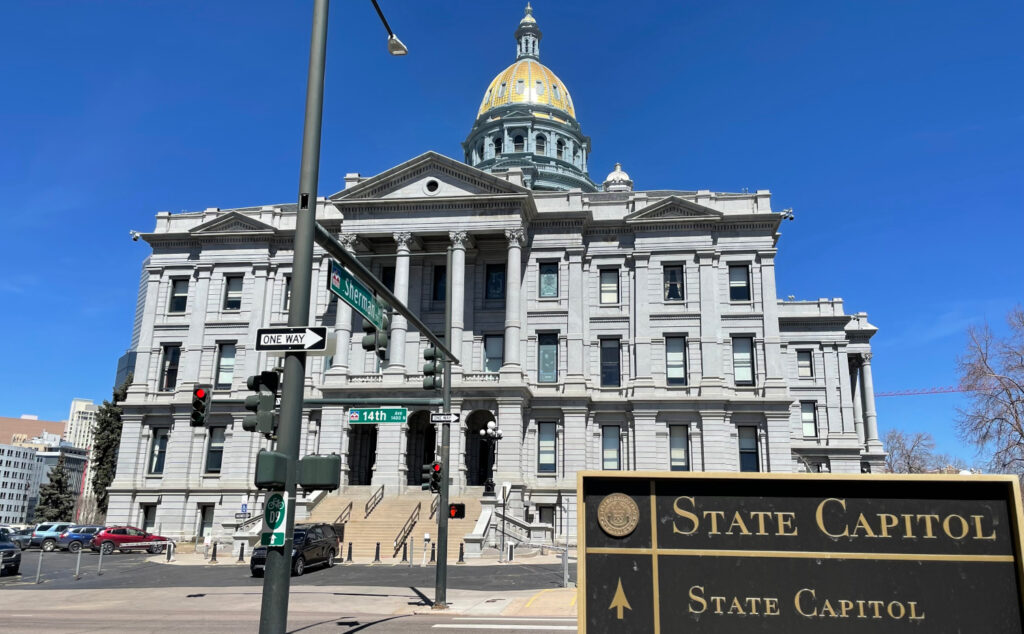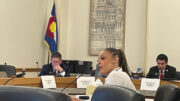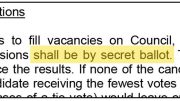By Jeffrey A. Roberts
CFOIC Executive Director
In a new court brief, leaders of the Colorado General Assembly defend their use during recent legislative sessions of an anonymous online survey to help prioritize bills that impact the state budget.
The conservative Public Trust Institute alleged in a July lawsuit that the “quadratic voting” system violates the Colorado Open Meetings Law and that legislators’ refusal to disclose individual voting records from the system violates the Colorado Open Records Act.
But a brief filed in Denver District Court on Friday by attorney Ed Ramey contends it is neither a secret ballot prohibited by the open meetings law, nor a meeting that must be open to the public as defined by the law. And legislators’ individual “score sheets” from the system are “precisely the information that the quadratic polling exercise does not consider and does not assemble and provide to the legislators.”

“Plaintiffs seek records from these Defendants which they — by the very design of the exercise — are prevented from possessing or accessing,” wrote Ramey, who represents the General Assembly’s two chambers, House Speaker Julie McCluskie (D-Dillon), Senate President Steve Fenberg (D-Boulder), Sens. Jeff Bridges (D-Greenwood Village) and Chris Hansen (D-Denver) and Senate Democrats’ budget and policy analyst Andrew Lindinger.
Suzanne Taheri, a former deputy secretary of state who represents the Public Trust Institute and individual plaintiff David Fornof of Douglas County, also submitted a brief Friday. In it, she argues that the quadratic voting process “circumvents long-established laws in Colorado that require the business of the People to be conducted in public light. By engaging a third party to collect votes and hold the individual QV records of legislators, Defendants constructed a wall where Colorado law requires a window.”
Democratic lawmakers started using quadratic voting in 2019 and by last year, according to KUNC, it had “become part of the fabric of decision-making,” alarming some legislators whose bills had been killed as well as government transparency advocates (including the Colorado Freedom of Information Coalition).
KUNC described the process this way: “Each April, lawmakers click on a personalized link to the anonymous survey. They then use digital tokens to vote for the bills they think should get a piece of the budget each year. They have four days to cast their votes for their top priorities, and party leaders end up with a bar chart showing how popular bills are.”
The survey is administered by RadicalxChange, a nonprofit founded by an economist. According to the brief submitted by Ramey, “[the] polling was closed by a stated deadline, the results were aggregated by the contractor, and cumulative spreadsheets anonymously ranking the support for each bill were provided to leadership and shared with the caucuses.”
“The object of the quadratic polling exercise at issue in this case was simply to develop an additional data point for consideration by Senate and House caucus leadership and the respective appropriations committees in both chambers in organizing and prioritizing fiscally-impactful bills for advancement in the legislative process,” the brief says.
Taheri’s court filing contends the quadratic voting system circumvents the open meetings law, which requires meetings of two or more members of a state public body that are convened to discuss public business — “in person, by telephone, electronically, or by other means of communication” — to be open to the public “at all times.” She noted that Colorado courts previously determined that legislative caucus meetings “are meetings of policy-making bodies within the meaning of the Colorado open meetings law” and that the law specifically prohibits voting by secret ballot, defined as “a vote cast in such a way that the identity of the person voting or the position taken in such vote is withheld from the public.”
“QV is the method by which leadership in both the Senate and the House of Representatives determined which bills would be prioritized and which bills would languish during the legislative session,” Taheri wrote. “Prioritizing bills is inarguably related to the formation of public policy. The individual ballots constituted votes, and they must therefore be disclosed to the public.”
Ramey’s brief argues that “the quadratic polling exercise” is not a secret ballot under the law because that prohibition only applies to the adoption “of any proposed policy, position, resolution, rule, or regulation” or “formal action.” He wrote that “[t]he exercise is merely the generation of another informational data point for later consideration (or disregard) … preliminary to any formal consideration or action concerning the merits or substance of any bill.”
Participation in the system cannot be deemed a “public meeting,” Ramey added, because the statute excludes electronic mail communications among elected officials that do not relate to “the merits or substance of pending legislation or other public business,” defined to mean “any discussion, debate, or exchange of ideas, either generally or specifically, related to the essence of any public policy proposition, specific proposal, or any other matter being considered by the governing entity.”
“To the extent the quadratic polling exercise could arguably be deemed a ‘meeting’ of some sort, it was wholly unrelated to the ‘merits or substance’ — or ‘essence’ — of any matter being considered,” Ramey’s brief contends. “… There was no ‘meeting’ to attend (in person or electronically),” it adds.
In a separate brief filed on behalf of Rep. Bob Marshall (D-Highlands Ranch), who also is a defendant in the lawsuit, attorney Cristel Shepherd argues that participation in the quadratic voting system is not a “meeting” because “it does not involve a gathering of two or more public officials where public business is discussed … Representative Marshall did not receive feedback or have any interactions (i.e., ‘discussions’) with any other legislator through his anonymous input of data into the quadratic system.”
The Public Trust Institute’s lawsuit also accuses lawmakers and Lindinger of violating CORA by withholding “score sheets” showing how each individual legislator voted. The organization’s brief disputes legislators’ claims that the survey results fit CORA’s definition of off-limits “work product” because that definition excludes “[a]ny final version of a document that expresses a final decision by an elected official.”
“The individual ballots cast in the QV process are the final decisions made by legislators regarding the prioritization of legislation in the 2023 session. Therefore, they cannot be excluded from disclosure under the ‘work product’ exception,” Taheri argued.
The fact that the ballots may be maintained by a third party, RadicalxChange, doesn’t necessarily make them exempt from disclosure under CORA, she added, citing a recent Colorado Court of Appeals ruling that makes third-party records subject to the law if a public entity has a contractual right to access them.
Oral arguments in the Public Trust Institute’s lawsuit are scheduled for Dec. 7. Fenberg has said that Senate Democrats may not use the quadratic voting system during the legislative session that starts in January.
Follow the Colorado Freedom of Information Coalition on Twitter @CoFOIC. Like CFOIC’s Facebook page. Do you appreciate the information and resources provided by CFOIC? Please consider making a tax-deductible donation.




